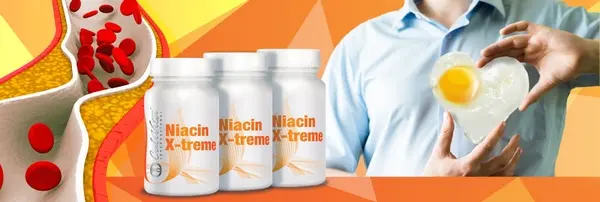Niacin – a B vitamin
Niacin is a water-soluble vitamin from the B vitamin family, which plays an important role in energy production in cells. Because it is water-soluble, the body does not have much opportunity to store it, so we must make sure that we get the right amount of it every day. This may seem a bit boring, but niacin is much more interesting than it seems when looking at the symptoms of its deficiency, so it's worth reading all the consumer reviews related to it.
Symptoms of niacin deficiency include weakness, fatigue, depression, digestive problems, abdominal discomfort and irritability, and circulatory problems (cold feet and hands). Many people taking niacin report that niacin, which they started taking for other reasons, makes them feel very energized and does not feel the symptoms of afternoon fatigue, as if they had had at least one cup of coffee, or that it helped them combat the problem of cold limbs.
The second, much more significant benefit of niacin is its therapeutic effect, which has been well observed in the United States for several years as it is used instead of or alongside cholesterol-lowering medications. Numerous studies confirm that niacin can not only increase the level of good cholesterol (HDL) in the blood, but can also reduce the level of bad cholesterol and other fats in the blood (triglycerides and Lp(a)). This alone is enough for some people, and there are already patients who supplement their therapies and take niacin alongside their medications, thereby reducing the risk of another heart attack.
The nicotinic acid form of niacin (especially if taken on an empty stomach) may cause facial flushing in some people, which may be accompanied by a feeling of warmth and tingling. However, this feeling does not last long and has no negative effects; Moreover, many people say that it is really pleasant.
What should you pay attention to if you are taking niacin?
First of all, the form and dosage of the active ingredient. The cholesterol-lowering effect has been experimentally observed at a dose of 1 – 1.5 grams per day, but it is worth starting with lower doses and very slowly reaching the target dose, even over a few weeks. In this way, it is possible to reduce skin symptoms perceived as side effects. It is also recommended not to take niacin on an empty stomach.
Slow-release products or so-called “no-flush” products containing niacin known from the American market are slowly becoming available on the market, they contain niacin in such a form that it produces weaker skin symptoms, but at the same time the lipid-lowering effect is less significant than pure nicotinic acid.
Niacin is another natural active ingredient that has been proven to help prevent and treat cardiovascular disease, and may help fight fatigue better than coffee!
Coming soon, a new product on the vitamin market Niacin X-treme
Sources:
Niacin: The Evidence, Clinical Use, and Future Directions – Todd C. Villines et al., Curr Atheroscler Rep (2012) 14:49–59
Niacin: chemical forms, bioavailability, and health effects – MacKay et al, Nutrition Reviews® Vol. 70(6):357–366




